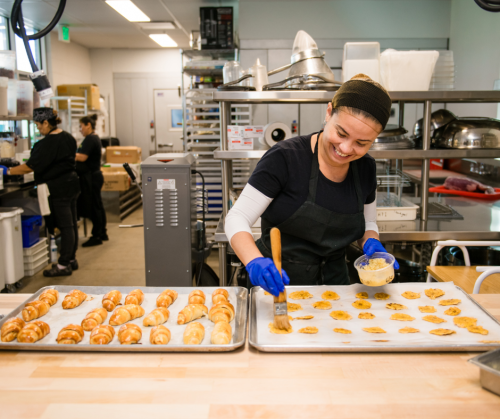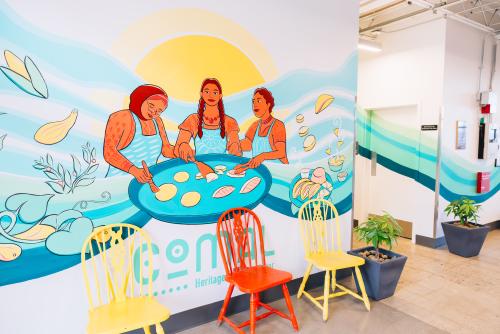Over human history, food has been the place where culture and necessity meet in the middle. Not just a tool for survival, food has the power to tell stories as recipes get passed down from generation to generation. Food can be an expression of love or a gift given to others. It can be a source of comfort. And for some, food is a pathway to creating a better life for themselves.
It is on that foundation that Comal Heritage Food Incubator, which focuses on immigrant and refugee women who want to be culinary entrepreneurs, was built.
 Like any other incubator, a food incubator provides expensive but crucial resources for aspiring entrepreneurs and makes them financially accessible; in the food world, this generally means providing certified kitchen space at an affordable price.
Like any other incubator, a food incubator provides expensive but crucial resources for aspiring entrepreneurs and makes them financially accessible; in the food world, this generally means providing certified kitchen space at an affordable price.
“A heritage food incubator has a commitment to respecting other cultures and the community served, which is reflected in the space and in the menu,” says Seynabou Sohai, senior manager of social enterprise at the Focus Points Family Resource Center, a family resource center and the parent organization of Comal.
Unlike other food incubators, Comal is also a culinary business training program with a restaurant that is open to the public and run by trainees. The restaurant’s menu changes seasonally and is always reflective of the cultures of the women in the program. Comal falls under the “economic inclusion” sector of Focus Points’ work in the community.
“There is a shortage of commercial kitchens and incubator programs in general,” Sohai says, which is why Comal was founded. “When you start pulling in barriers and different systemic racial issues come into play, language, it makes it even harder.” (For context, commercial kitchen use is not only cost-prohibitive, but it is a legal requirement outside of the cottage foods business.)
At any given time, Comal is training 15-20 women from a myriad of countries across the globe, such as Venezuela, Ecuador, Colombia, Mexico, Syria, Ethiopia, India and more.
“We try to make it fairly easy,” says Sohai.
Applicants apply via a Google form, answering questions that allow Comal to pull the correct resources to support each person when they come into the incubator – questions such as whether they have internet access, what languages they speak and what their goals are.
Sohai lists examples: “Are their goals entrepreneurship? Are they workforce? If they’re entrepreneurship, what kind of business do they want to start? Why do they want to start it?” The women participating in the program all have wildly different goals, backgrounds and levels of experience. “Some of them have professional cooking backgrounds already,” she says. “Some have taken business classes, some haven’t.”
On the workforce side of things, Comal doesn’t just train for the workforce – they also offer management training. Questions there revolve around the cuisine of choice and specialties, as well as encouraging participants to consider what kind of place they’d like to manage.
“We have one participant who wants to specialize in vegetarian and vegan Hispanic foods,” Sohai says. “We try to see what their goals are. What are their short-term goals? Long-term goals? And then we ask how they found us.”
 The vast majority of Comal’s recruitment comes from word-of-mouth.
The vast majority of Comal’s recruitment comes from word-of-mouth.
“[Participants] can stay in the program up to three years,” adds Sohai. “To simplify it, the most important part] is their growth.”
Comal’s trainees are educated in countless ways; culinary skills, professional skills, managing finances, computer literacy and time management.
“Some of [these women] come from some really traumatic backgrounds,” Sohai says. “Coming here and being able to not be shy, feeling safe, opening their first bank account ever […] it’s important for us and it’s important for them,” Sohai says with a smile. “I’m glad we get to participate with [these women] on that.”
At the end of the day, Comal’s focus is on nurturing these trainees and the community surrounding them — which is where the restaurant comes into play.
“Historically, [the restaurant] has been a lunch counter. We offer breakfast now!” Sohai laughs. Comal is also available for catering, or for rental as an event space (whether the renter caters with Comal or not.) Wholesale offerings to customers and other businesses are also on the horizon. “People know the tamales and tortillas, and they’re all made by hand. They ask, ‘Can I buy some more just to take?’”
Comal’s educators come from various places — some being the staff themselves.
“One person has about 15 years in hotel and restaurant hospitality. I myself have been a chef for 15 years,” Sohai says.
Comal also pulls in speakers and guests and collaborates with other organizations like the International Rescue Committee (IRC) for financial education and entrepreneurship, where students are taught how to create an LLC, how to market themselves and the like.
Says Sohai, “We also work with CSU Spur’s education coordinators to build our curriculum […] we get a lot of community support.”
There are other partnerships in the works that will include technical classes focusing on web design and building websites that will best represent them and the food they create.
“Food is very personal and heartfelt,” says Sohai. “We want [our trainees] to build it where their customers will come and they’re supported.”
Donations are always welcome, and the best way for the Denver metro area to donate/support Comal is by dining in the restaurant, which has moved from its original location to 1950 35th Street in the River North Art District (RiNo). (Online ordering is offered as well.) The new location also now has parking available, since construction is (finally) wrapping up in the area.
“[Our trainees] really love feeding the community,” Sohai says. “Having people come through the doors is something they look forward to every day.”



